Alon Shalev's Blog, page 55
November 9, 2011
Street Protests – Both Sides of the Streets.
So I understand why big business and government (if they even are separate entities) are worried when the masses hit the streets in protest as we are witnessing with the Occupy movement. And I can see why the democrats and other liberals see the threat of the rising Tea Party.
Where I am stuck is the criticisms being leveled by Tea Party or Occupy activists at each other. Now to disagree about policy or ideology is a vital ingredient in a democracy, but it surprises me to hear criticism being leveled at tactics. After seeing a bevy of Tea Party activists denigrating the Occupy people for err…mass protests. I shared their audacity with a two (separately) friends who proceeded to level the same criticisms about the Tea Party people.
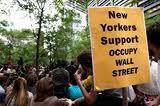
One side of the street
Now I don't expect every Tea Partier or Occupier to meet each other, occupy a Starbucks or independent cafe, and discuss matters over a cup of tea. But thinking people on both sides must be aware that they share some things in common.
- They are angry, dissatisfied and frustrated.
- They have taken to the streets because it seems the only way they will be listened to.
- They believe in grassroots organization.
- They have lost faith in the stagnation of government.

...and the other.
Something awesome is happening. The generally stupefied, apathetic masses are stirring. Whether they head for one side of the street to protest or the other, something has galvanized them into action. I don't believe there are many of us in the middle, but that doesn't matter. Let's keep protesting, keep fighting for change, keep hoisting our signs…
But let's stop for one moment and acknowledge that we are all in favor of democracy and freedom. Let's celebrate living in a society where we can protest and debate. Let's even be proud that we are drawing people away from mind-numbing reality shows and soaps. It is a healthy sign that people are lining up on both sides of the streets.
Then let's get back to debating the issues.
——————————————————————————————————
Alon Shalev is the author of The Accidental Activist (now available on Kindle) and A Gardener's Tale. He is the Executive Director of the San Francisco Hillel Foundation, a non-profit that provides spiritual and social justice opportunities to Jewish students in the Bay Area. More on Alon Shalev at http://www.alonshalev.com/ and on Twitter (#alonshalevsf).








November 8, 2011
Corporations and the Race to the Garbage Heap – Tom Rossi.
There are many reasons that the corporate model stinks. It stinks as a paradigm for running a society, but it also (maybe surprisingly to some) stinks just as a model for business. Today, let's just look at one of the reasons that the smell is rising and getting worse.
It's just not good enough, for a corporation, to make something, sell it, and make money. That would lead to a somewhat stable share price for the corporation's stock, which would certainly lead to the CEO getting fired from his ridiculously overpaid job.
To make the stock's price rise, changes have to take place and profits increased pretty much all the time. There are two basic ways to increase profits – increase revenues or cut costs. Let's look at the cost-cutting side. On the surface, it might appear that cutting costs is a good thing. This would certainly line up with the mythology that we often swallow without question. After all, efficiency is good, right? But efficiency in business is measured only in dollars – not in resource use or (God forbid!) something like overall drain on a society.
As a result, corporations are always looking to substitute cheaper materials into their products and looking for cheaper labor, even if that means hiring unqualified workers at low wages in a developing country or taking away benefits from workers here at home. They also lobby the government to reduce regulation (or not to create it in the first place) so that they can freely dump waste into the air and water. 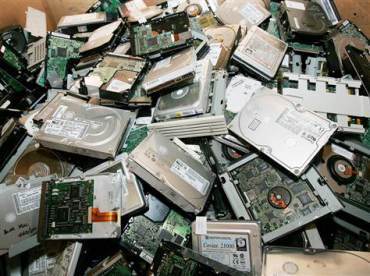
OK, so sue me… I'm digressing a little into social issues here. Let's get back to materials and labor. Corporations' own systems often drive them to produce shoddier and shoddier products, even while the bells and whistles keep piling up. How long do you expect a computer printer to last? Or the computer itself, for that matter? TVs, DVD players, car stereos, (frying pans even!) and thousands of other things are all just expected to stop working or fall apart after a couple of years. Why? Is technology getting worse? 
Of course not. But workmanship is, and it's because everything has to be made faster and cheaper. These days, you sell products by adding gizmos and through a mind-numbing barage of marketing. We have all been convinced that we won't want our products in a year or two anyway, because by then a new model will come out that jumps up from the table and does a touchdown dance or something. 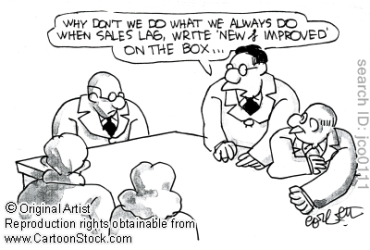
The effect is that the products of corporations constantly slide toward "just barely good enough." Excellence as a manufacturing pursuit is limited to things sold for the express purpose of showing off, like a Rolex watch (some car manufacturers have also done some good work).
Coincidentally, the time when products were getting better across the board (1940′s, 50′s, and 60′s) was the time when the American worker was sharing in the prosperity enjoyed by corporations. The "race to the bottom" didn't exist. Now it seems we just can't wait to get there.
-Tom Rossi
___________________________________________________________________________
Tom Rossi is a commentator on politics and social issues. He is a Ph.D. student in International Sustainable Development, concentrating in natural resource and economic policy. Tom greatly enjoys a hearty debate, especially over a hearty pint of Guinness.
Tom also posts on thrustblog.blogspot.com
___________________________________________________________________________








November 7, 2011
Amazon Challenges Publishers Pt.2
This is a continuation of Friday's post, a further examination of Amazon's new approach to woo authors.
Barry Eisler, who turned down an attractive offer from St. Martin's Press, and is publishing his new book himself through amazon is not deterred by the claim that he is restricting his audience by only publishing for Kindle readers. Eisler states that his book will be available without DRM (digital rights management) and therefore it can be read on any e-book reader, including the Nook and the Kobo. Many of us have, in addition to publishing through amazon, also published through the successful Bay Area start up Smashwords which I discussed a while ago on Left Coast Voices.
More telling, Eisler can sell his book at a low and attractive price for a broader audience. With a traditional publisher, a hardcover would cost $25, and astonishing in my opinion, an ebook for as much as $13. "Availability six months earlier and at half the price seems like a pretty good deal for readers to me," Eisler added and you can see his point.
This new strategy between amazon and authors such as Eisler, or popular author Tim Ferriss, is a hard blow for traditional publishers. They had been more than tolerant with writers such as Amanda Hocking who created their fan base outside of the traditional framework only for a publisher to step in and help both the author and publisher profit. This new strategy, however, is pulling popular writers such as Ferriss and Eisler away from traditional publishing world.
In the process, Amazon is making the rest of the traditional industry look out-dated, inefficient, and profit-driven. If they are to woo such authors, they must shorten their publication process which is glacial in comparison to Amazon. They also need to understand that their price structure is antiquated in the face of technology.
I do not think that all is lost, however. Many of these emerging authors are businessmen and women and extremely pragmatic. Read John Locke's new book as a case in point.
As Eisler puts it: "My objectives were to make more money from the title, to get the digital out first, and to retain more control over business decisions. If a better way comes along … of course I'm going to take it. Publishing for me is a business, not an ideology."
The market is such that an author will take a publishing deal if it is lucrative enough. If it is not, however, they might decide to look for other options and Amazon is ready to welcome then in. The ball is in the court of the major publishers. They need to adapt fast or risk joining the dinosaurs.
——————————————————————————————————
Alon Shalev is the author of The Accidental Activist (now available on Kindle) and A Gardener's Tale. He is the Executive Director of the San Francisco Hillel Foundation, a non-profit that provides spiritual and social justice opportunities to Jewish students in the Bay Area. More on Alon Shalev at http://www.alonshalev.com/ and on Twitter (#alonshalevsf).








November 5, 2011
Bank Transfer Day
A friend of mine was frustrated with the General Strike on Wednesday in Oakland and with the Occupy Wall Street in general. While a member of the 99% and sympathetic to the cause, she had just heard from a worker at the Port of Oakland, who is paid hourly and worried that he lost a day's income that he needs to feed his family.

From Star Wars to General Strike
We are hurting the very people we are supposed to be fighting for, she said (these are my words). Do you really think we hurt the 1% at the ports? She went on to complain that it is frustrating that there is no clear agenda and no clear tactics that will hurt those we are challenging to change their selfish and greedy practices.
She is right. I think I argued with her and probably lost because I knew she is right (Don't tell her I wrote this!). I reminded her about the post that my colleague Tom Rossi wrote with a clear list of demands, but I had to concede about tactics.
But today, we can do something…and I mean today. As part of the Occupy Wall Street campaign there is a call for people to move their money from for-profit financial institutions to credit unions. So far, almost 80,000 people have made the commitment on Facebook to "send a clear message that conscious consumers won't support companies with unethical business practices."

Patelco - my credit union
More than $4.5 billion have been moved into new savings accounts in credit unions according to CUNA. 80% of credit unions are recording significant member growth since the campaign began at the end of September, which was a reaction to the debit card fees that have since been dropped.
Skeptics say that even if the entire 80,000 were to move their money, this would represent less than 1% of just Bank of America's customers. There is an estimated $7.5 trillion in banks, including loans and savings. B of A has 57 million customers.
However, there is potential here to make Wall Street listen, even if not to bring it to its knees. The rescinding of the debit card charges is a good lesson. Even when chasing the most profit, a company, even one the size of B of A has to listen to its clients.
And what if every one of those 80,000 who signed up persuaded 5 of their friends. 400,000 people could transfer $30 million. November 5th was the date set for protestors to complete their transfers because the organizers wanted to create a measurable impact. I regret not writing on this earlier. But even if you cannot get out today and transfer your money, or want to research deeper, the banks will take notice if more people continue to protest by moving money into the people-friendly (and people-owned) credit unions.
Thought the organizers of Bank Transfer Day want to distance themselves from Occupy Wall Street, history (and even in a year's time) just might record Bank Transfer Day as the most effective measure to come out of this time period. It might also be a turning point in the utilization of the Internet to make strategic strikes and to conduct dissent away from demonstrations, something which is often regarded by people as intimidating.
And perhaps in a year, my friend and I might look back on this period of time together as one of change and one of pride.
——————————————————————————————————
Alon Shalev is the author of The Accidental Activist (now available on Kindle) and A Gardener's Tale. He is the Executive Director of the San Francisco Hillel Foundation, a non-profit that provides spiritual and social justice opportunities to Jewish students in the Bay Area. More on Alon Shalev at http://www.alonshalev.com/ and on Twitter (#alonshalevsf).
November 4, 2011
Amazon Challenges Publishers Pt.1
Friday today and another story from the publishing world. Amazon.com continue to redefine the publishing world. Earlier this month they released a new line of kindles, the handheld reading devices. At the bottom end, the basic no-frills model comes at the lowest price yet of $79, while at the upper end, the Kindle Fire has color and can be used to stream movies, surf the Internet, play games and host a vast amount of apps. Apple junkies are quick to point out that it lacks many features of the iPad, but with the Fire at half the price, it has to take a bite out of iPad sales (do we have an iPad 3 coming out soon?).
 But Amazon are taking other steps to dominate the book world. The features of the new Flame has techie junkies claiming that Amazon are about to launch a "Netflix for books." They already have their own self-publishing platform (Createspace) and even created a streamlined publishing platform that is solely digital based.
But Amazon are taking other steps to dominate the book world. The features of the new Flame has techie junkies claiming that Amazon are about to launch a "Netflix for books." They already have their own self-publishing platform (Createspace) and even created a streamlined publishing platform that is solely digital based.
Now Amazon are busy signing up authors for their own imprint. I have already featured authors who have learned to use the system to amazing results including J.A. Konrath and young-adult author Amanda Hocking — who made more than two million dollars by publishing her own books via the Kindle marketplace before signing a $2-million deal with a traditional publisher earlier this year.
Now there is an interesting new addition. Thriller writer Barry Eisler, a former CIA operative turned author, made his name as a self-publishing success story. However, when his sales garnered the publishing industry's attention in a big way, he turned down a $500,000 advance for two books with St. Martin's Press in March, and announced he would self-publish his new novel instead.
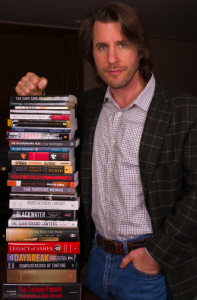
Eisler wants his independence and the most efficient model
In an NPR interview, Eisler — who has several New York Times bestsellers which were published traditionally — says he has come to the conclusion "that mainstream publishers simply aren't as efficient or as useful to authors as they used to be, now that there are other options."
"To say that publishers really care passionately about books as though they are concerned about what's better for the world … I'm sure when they look in the mirror they feel that way. But in fact, what they care about is preserving their own position, perks and profit — that's just what establishment players come to do over time."
I'm not sure that this is a fair comment. The publishing houses have a right to chase profits and both publishers and agents that I have approached or been approached by, were very honest about this. If an author is going to get offended (and I'm not claiming Eisler is) when a publisher asks more about your marketing model and target audience rather than focus on the quality of your story or the message behind it, then the author also might need to look in the mirror.
Eisler was more direct, I think, in the New York Observer, when he says that one of the reasons he decided to decline the St. Martin's deal was that the publisher was simply too slow in meeting its obligations. St. Martin's, for example, took more than four months just to send a draft contract, "and during that time, the landscape of the industry had changed to the point where many of the terms were no longer acceptable — in part because of the explosion of e-books and self-publishing."
Eisler also criticized legacy publishers who deliberately slow down the process of publishing a book, to earn interest on the money they would otherwise have to pay to authors. "By contrast, he said, Amazon was willing to sign a deal immediately and then guarantee to have the e-book version and the paperback version of his new books on the market long before a traditional publisher could."
"What I care about is readers, because without readers I can't make a living [and] I want people to read a lot. To that end, if I can find a way to get readers books that cost less and are delivered better and faster, I want that."
Eisler's frustrations, long expounded by authors, were heard by a opportunist giant in the book world, who is willing to listen to its authors and readers and adapt. More tomorrow.
——————————————————————————————————
Alon Shalev is the author of The Accidental Activist (now available on Kindle) and A Gardener's Tale. He is the Executive Director of the San Francisco Hillel Foundation, a non-profit that provides spiritual and social justice opportunities to Jewish students in the Bay Area. More on Alon Shalev at http://www.alonshalev.com/ and on Twitter (#alonshalevsf).








November 3, 2011
Conniving Rats – Roger Ingalls
*WARNING: ANGRY POST*
To avoid dissension within the ranks; I rarely speak negatively about President Obama. But there comes a time when you just have to say what's on your mind. Now, is that time.
Whenever the Obama Administration asks Americans for input on policy via social media sponsored by Facebook or through the We the People website, the number one issue proposed by citizens is the legalization of medical cannabis.
During the Facebook interviews, the President never addresses the medical issue but instead condescendingly laughs before moving on. And recently, the administration released a negative response to the peoples' popular cannabis petition posted on the White House's We the People site.
The response referenced the usual FDA and Institute of Health naysayers that employ ex-pharma executives and lobbyist. These organizations have more foxes in the hen house than there are hens! Instead of snickering at the peoples' requests, the President should be laughing at these government groups because they truly are jokes – they're big business puppets.
Beyond the lies spattered throughout the release, the most troublesome aspect was the carefully worded phase "smoked marijuana" with the word "smoke" in italic.
This cleverly worded phrase is a setup. The release is setting the stage for big pharma to step in and take an organic medicine and turn it into a processed drug that can generate large revenues while making it illegal for small existing businesses to provide a natural low cost product. It will also prevent people from growing their own organic medicine. In this release, the Obama administration is saying that organic cannabis (that is commonly smoked) is bad but marijuana processed by big business is worth investigating.
It's no accident that the President has taken this position. Big pharma is one of the three biggest contributors to political campaigns.
Just once, I'd like a politician to stand up and speak honestly. Perhaps something like this: "My fellow Americans, I'm sorry. I cannot push for the legalization of medical cannabis. Even though this organic and safe medicine would obsolete 30 to 50% of today's expensive and dangerous pharmaceuticals, I can not make cannabis legal. I sold my soul to the biggest bidder and you, my deceived friends, are not the highest bidder. My bed belongs to big pharma. Again, I'm sorry but you are irrelevant."
Come November 2012 I may change my tune but today, President Obama and Big Pharma are conniving rats.
Support your local Occupy Movement; it's a voice that politicians and big business fear.
Fear Creates Relevance.
—————————————————
Roger Ingalls is well traveled and has seen the good and bad of many foreign governments. He hopes his blogging will encourage readers to think more deeply about the American political system and its impact on US citizens and the international community.
[image error]







November 2, 2011
Ist Interview of the Blog Tour
Following Inga's review yesterday at Me and Reading, here is the link to the interview that we did.
Thank you again, Inga.
——————————————————————————————————
Alon Shalev is the author of The Accidental Activist (now available on Kindle) and A Gardener's Tale. He is the Executive Director of the San Francisco Hillel Foundation, a non-profit that provides spiritual and social justice opportunities to Jewish students in the Bay Area. More on Alon Shalev at http://www.alonshalev.com/ and on Twitter (#alonshalevsf).
Jewish Heart for Africa
Jewish Heart for Africa is a non-profit 501(c)(3) organization that brings sustainable Israeli technologies to rural African villages. Since its founding in 2008, Jewish Heart for Africa has completed more than 35 solar powered projects, bringing light to schools to improve education, pumping clean water in regions of drought and providing refrigeration for lifesaving medicines and vaccines.
To date, they have brought solar energy to over 150,000 African people, and 12,000 children have been vaccinated with vaccines stored in their solar powered refrigerators.
Here is a 6-minute introduction to their work.

This week, Jewish Heart for Africa is holding it's main fundraising event of the year. Most of us won't be attending the event in New York, but we can still help to provide sustainable solutions to provide the poorest people on our planet receive the basics we take for granted: clean water, electricity, medicine, clean energy, relevant food production methods.
It is surprising what a difference $18 or $36 gifts can make. Even if you can't make the gala, please consider a small gift. And please pass this post on to friends and colleagues. We can defeat poverty. We have the technology and the capability. What's stopping us? What's stopping you?
——————————————————————————————————
Alon Shalev is the author of The Accidental Activist (now available on Kindle) and A Gardener's Tale. He is the Executive Director of the San Francisco Hillel Foundation, a non-profit that provides spiritual and social justice opportunities to Jewish students in the Bay Area. More on Alon Shalev at http://www.alonshalev.com/ and on Twitter (#alonshalevsf).
November 1, 2011
Virtual Tour Begins
Inga Kupp from Estonia, the owner of Me and Reading, is the first stop of my virtual book tour. Her review can be found here.
Thank you Inga.
——————————————————————————————————
Alon Shalev is the author of The Accidental Activist (now available on Kindle) and A Gardener's Tale. He is the Executive Director of the San Francisco Hillel Foundation, a non-profit that provides spiritual and social justice opportunities to Jewish students in the Bay Area. More on Alon Shalev at http://www.alonshalev.com/ and on Twitter (#alonshalevsf).

 [image error]
[image error]


 [image error]
[image error]

Occupy Wall Street Means Business
Recent events – "evictions" (sometimes violent) of "Occupy" protesters, the statements of public officials, and many media reports, have revealed something about those in control of our so-called democracy.
"Occupy" protesters are doing what is just not allowed in the so-called, "Home of Freedom," they are calling into question the assumptions of the power system, of the status quo, of the "free" market. Since the 1950′s and Senator McCarthy's witch hunts, this kind of talk has been simply shunned.
The reaction of the "establishment" to this mass exercise of first amendment rights has been somewhat predictable. For weeks the protests were ignored and treated by the major media outlets as if they were just a few unemployed, pissed-off people venting some steam. Then, when the protests didn't go away (and in fact started to grow) they were ridiculed. "The protesters have no demands, no agenda." the press reported – over and over again.
The goal of major media corporations has been to marginalize the occupy protesters, to make them appear as a fringe group of malcontents – the losers of society that didn't work hard or smart enough to make it in a completely reasonable and fair system. The message was clear: "These peopla aren't like you. You're not a directionless loser, are you?"
The establishment assumed that their efforts had been succesful – after all, the same methods had certainly been successful in 2003 in the lead-up to the Iraq "war." And if they had been correct, the majority of Americans would have cheered when the police took advantage of the anonymity afforded by "riot" helmets and broke up occupy protests with arrests, nightsticks, rubber bullets, and tear-gas. But they were wrong.
The "malcontents" of America are legion. But wait, doesn't everybody just want, well, what we're all supposed to want? Money? Bigger houses? Bigger TVs? Bigger and bigger SUVs? Aren't these people just pissed off because their march toward material bliss has been interrupted by a dip in our perfect, capitalist juggernaut? No. I've met many of these "malcontents" and they represent those who are immune to the brainwashing television commercials that are intended to define us so completely; the commercials that say: "Buy, and thou shalt be happy." 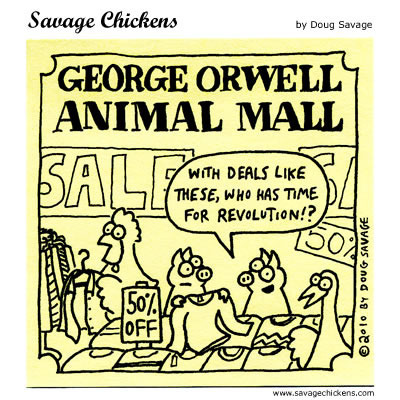
The lunatic fringe of America is made up of those crazy people who would be content with a decent place to live, a reasonable means of transportation, good, clean food, clean air to breath, the shade of some trees, and the love and companionship of family and friends. Maniacs to be hated and feared, for sure.
Why do these sociopaths question what is seen (by those who have a huge advantage in the current system) as "the Natural Order?" After all, capitalism is the system that most resembles the insect world – the strong eat the weak. Isn't that the way things should be? If you "lose", don't you deserve to lose? 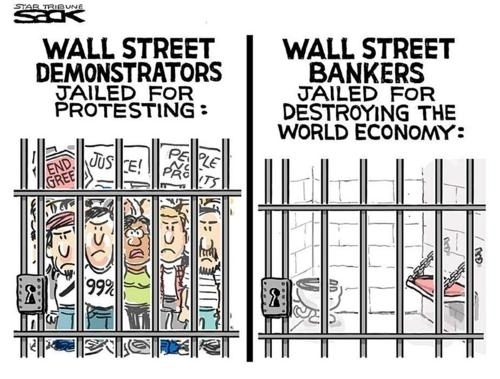
That gets us to what might be the central question of our race – the human race: How do we want to live? If we had no laws and no organization I, as a 225 pound former college hockey player, could simply walk down the street, punch somebody in the face, and take their wallet. And a guy bigger than me could do the same to me, as could an eight-year-old girl with a gun.
My point is that we have governments and laws for the express purpose of rising above the "Natural Order." We have decided, as a human society (in America and pretty much everywhere else on Earth) that the strong will not take advantage of the less strong. But this is not just true of physical strength, but of economic strength as well.
In simplest terms, I shouldn't be able to pay someone to beat somebody up for me either. That's pretty obvious. But why do we allow corporations to pay our government officials to take away our rights? To protect them instead of us?
This is the big-picture "demand" of the Occupy movement, and it has one weapon in its arsenal – persistence. The occupy movement looks to me like it's here to stay and I give my heartfelt thanks to everyone who is willing to camp out in the streets all night and/or march in the daytime. Occupiers know that, if they allow the movement to deteriorate into violence or vandalism, they will undermine themselves.
Occupiers are out to change an ingrained pecking order. They are out to do away with the "survival of the fittest" mentality – especially when fitness has much more to do with inherited status than with original work or accomplishment.
Persistance… That's the thing. The only thing.
-Tom Rossi
___________________________________________________________________________
Tom Rossi is a commentator on politics and social issues. He is a Ph.D. student in International Sustainable Development, concentrating in natural resource and economic policy. Tom greatly enjoys a hearty debate, especially over a hearty pint of Guinness.
Tom also posts on thrustblog.blogspot.com
___________________________________________________________________________



































